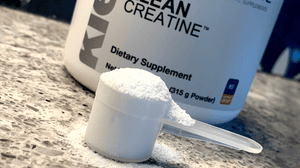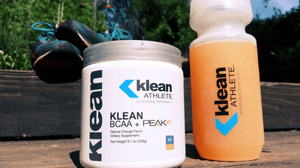
Predicted to have a global worth of nearly $37 million by 2033, pre-workout is an increasingly popular supplement that doesn’t look set to slow down anytime soon.
But despite its popularity, what pre-workout is and how it may impact performance can often be misunderstood. To help you decide if it’s the right sports supplement to support your fitness goals, we’ve got all the information you need to know.
What Does Pre-Workout Do?
Pre-workout is a sports supplement that aims to promote focus and performance during intense physical activity, such as weightlifting.‡
They are often comprised of a number of carefully formulated ingredients, to ensure that they work synergistically for maximum results.
Some of the most common ingredients you can expect to find in pre-workout include:
Amino Acids in Pre-Workout
The branched-chain amino acids (BCAAs), leucine, isoleucine, and valine are three of the nine essential amino acids (EAAs). They have a slightly different chemical structure to the other six as they cannot be made by the body, they must be obtained through protein-rich foods or dietary supplements.
While further investigations are still required to fully establish the role of BCAAs on muscle growth, it is thought that they may help by supporting muscle protein synthesis.‡
Some studies also indicate that BCAAs could support muscle repair and soreness following high-intensity training.‡
Pre-Workout with Beta-Alanine
Beta-alanine is a non-essential amino acid, which means it can be produced by the body. While research into the full extent of the potential benefits on athletic performance is still ongoing, supplementation is thought to support high-intensity workouts, such as sprinting and weightlifting.‡
This is because taking beta-alanine orally is thought to aid in the production of carnosine, which is a molecule that is required for a number of functions, including muscle contraction.
Caffeine in Pre-Workout
Thought to be an effective ergogenic aid, caffeine is frequently found to be the main component of pre-workout supplements. In fact, studies have shown that ingesting a moderate dose of caffeine (3-6mg/kg body mass) improved endurance by around 3%.
Research on the effect of caffeine on physical performance is still emerging, however, it is thought that it plays a role in reducing the rate of perceived exertion (RPE) during exercise, by as much as 5.6%, which may benefit performance.
Pre-Workout with Creatine
A popular dietary supplement amongst athletes, creatine could help to support muscle mass and strength when combined with resistance training.‡
It was found to be particularly effective when taken in conjunction with short-duration, high-intensity exercise, such as plyometric training. This is because creatine can help to restore the amount of adenosine triphosphate (ATP) - the main source of energy in the body’s cells – to improve strength and power during short bursts of exertion.
Beetroot Powder in Pre-Workout
Botanical ingredients are commonly found in pre-workout - one of which is beetroot powder.
Beetroot contains nitrates which the body converts into nitric oxide (NO) once consumed. Studies have shown that this helps to increase blood flow, and the delivery of oxygen to muscles, which may be beneficial during exercise.

How Much Caffeine is in Pre-Workout?
The amount of caffeine found in pre-workout can vary, but it is not recommended for people to consume more than 400mg per day (including coffee and other caffeinated beverages). Our Klean Pre-Workout contains 75mg of caffeine per serving.
If you are sensitive to caffeine, it is advised to opt for a pre-workout with a low caffeine content and start with half the recommended dose before gradually increasing if required.
How to Take Pre-Workout
Usually, in a powdered form, pre-workout is designed to be mixed with water before exercise as this may help with absorption.
It is recommended that you read the packaging and follow the preparation instructions before taking a pre-workout supplement. However, if you are new to it, it may be worth reducing your initial dose in order to assess your tolerance.
Likewise, before introducing a new supplement into your routine, always check with your doctor or healthcare provider; particularly if you have pre-existing health conditions.
When Should You Take Pre-Workout?
Pre-workout is generally intended to be taken around 30-60 minutes prior to exercise to give the ingredients a chance to be absorbed by your body and support your performance.
If you are using a pre-workout that contains stimulants, such as caffeine, it is recommended that you take it in the morning to avoid disrupting your sleep.
How Long Does Pre-Workout Last?
The time it takes for pre-workout to last can vary from person to person and may even depend on the intensity of the workout. Additionally, the formulation may have an impact as the lasting effects of the ingredients could take around four hours to wear off.
For this reason, it’s important to check the blend of ingredients to establish how they may affect you. Some pre-workouts may not be suitable for your afternoon or evening sessions as their effects could have an impact on your sleep quality and, in turn, your recovery.
If you’re looking for that extra boost to help take your workout to the next level, pre-workout might be the supplement for you.









